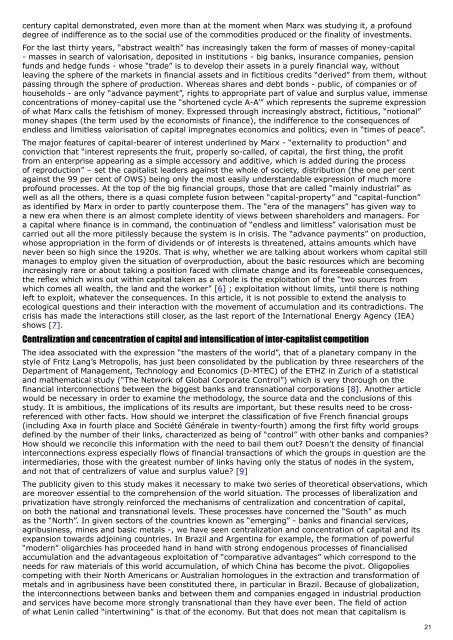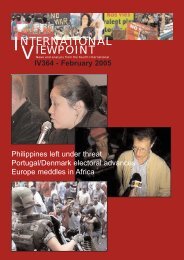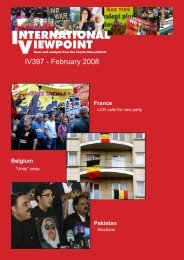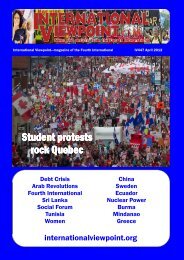download - International Viewpoint
download - International Viewpoint
download - International Viewpoint
Create successful ePaper yourself
Turn your PDF publications into a flip-book with our unique Google optimized e-Paper software.
century capital demonstrated, even more than at the moment when Marx was studying it, a profound<br />
degree of indifference as to the social use of the commodities produced or the finality of investments.<br />
For the last thirty years, “abstract wealth” has increasingly taken the form of masses of money-capital<br />
- masses in search of valorisation, deposited in institutions - big banks, insurance companies, pension<br />
funds and hedge funds - whose “trade” is to develop their assets in a purely financial way, without<br />
leaving the sphere of the markets in financial assets and in fictitious credits “derived” from them, without<br />
passing through the sphere of production. Whereas shares and debt bonds - public, of companies or of<br />
households - are only “advance payment”, rights to appropriate part of value and surplus value, immense<br />
concentrations of money-capital use the “shortened cycle A-A’” which represents the supreme expression<br />
of what Marx calls the fetishism of money. Expressed through increasingly abstract, fictitious, “notional”<br />
money shapes (the term used by the economists of finance), the indifference to the consequences of<br />
endless and limitless valorisation of capital impregnates economics and politics, even in “times of peace”.<br />
The major features of capital-bearer of interest underlined by Marx - “externality to production” and<br />
conviction that “interest represents the fruit, properly so-called, of capital, the first thing, the profit<br />
from an enterprise appearing as a simple accessory and additive, which is added during the process<br />
of reproduction” – set the capitalist leaders against the whole of society, distribution (the one per cent<br />
against the 99 per cent of OWS) being only the most easily understandable expression of much more<br />
profound processes. At the top of the big financial groups, those that are called “mainly industrial” as<br />
well as all the others, there is a quasi complete fusion between “capital-property” and “capital-function”<br />
as identified by Marx in order to partly counterpose them. The “era of the managers” has given way to<br />
a new era when there is an almost complete identity of views between shareholders and managers. For<br />
a capital where finance is in command, the continuation of “endless and limitless” valorisation must be<br />
carried out all the more pitilessly because the system is in crisis. The “advance payments” on production,<br />
whose appropriation in the form of dividends or of interests is threatened, attains amounts which have<br />
never been so high since the 1920s. That is why, whether we are talking about workers whom capital still<br />
manages to employ given the situation of overproduction, about the basic resources which are becoming<br />
increasingly rare or about taking a position faced with climate change and its foreseeable consequences,<br />
the reflex which wins out within capital taken as a whole is the exploitation of the “two sources from<br />
which comes all wealth, the land and the worker” [6] ; exploitation without limits, until there is nothing<br />
left to exploit, whatever the consequences. In this article, it is not possible to extend the analysis to<br />
ecological questions and their interaction with the movement of accumulation and its contradictions. The<br />
crisis has made the interactions still closer, as the last report of the <strong>International</strong> Energy Agency (IEA)<br />
shows [7].<br />
Centralization and concentration of capital and intensification of inter-capitalist competition<br />
The idea associated with the expression “the masters of the world”, that of a planetary company in the<br />
style of Fritz Lang’s Metropolis, has just been consolidated by the publication by three researchers of the<br />
Department of Management, Technology and Economics (D-MTEC) of the ETHZ in Zurich of a statistical<br />
and mathematical study (“The Network of Global Corporate Control”) which is very thorough on the<br />
financial interconnections between the biggest banks and transnational corporations [8]. Another article<br />
would be necessary in order to examine the methodology, the source data and the conclusions of this<br />
study. It is ambitious, the implications of its results are important, but these results need to be crossreferenced<br />
with other facts. How should we interpret the classification of five French financial groups<br />
(including Axa in fourth place and Société Générale in twenty-fourth) among the first fifty world groups<br />
defined by the number of their links, characterized as being of “control” with other banks and companies?<br />
How should we reconcile this information with the need to bail them out? Doesn’t the density of financial<br />
interconnections express especially flows of financial transactions of which the groups in question are the<br />
intermediaries, those with the greatest number of links having only the status of nodes in the system,<br />
and not that of centralizers of value and surplus value? [9]<br />
The publicity given to this study makes it necessary to make two series of theoretical observations, which<br />
are moreover essential to the comprehension of the world situation. The processes of liberalization and<br />
privatization have strongly reinforced the mechanisms of centralization and concentration of capital,<br />
on both the national and transnational levels. These processes have concerned the “South” as much<br />
as the “North”. In given sectors of the countries known as “emerging” - banks and financial services,<br />
agribusiness, mines and basic metals -, we have seen centralization and concentration of capital and its<br />
expansion towards adjoining countries. In Brazil and Argentina for example, the formation of powerful<br />
“modern” oligarchies has proceeded hand in hand with strong endogenous processes of financialised<br />
accumulation and the advantageous exploitation of “comparative advantages” which correspond to the<br />
needs for raw materials of this world accumulation, of which China has become the pivot. Oligopolies<br />
competing with their North Americans or Australian homologues in the extraction and transformation of<br />
metals and in agribusiness have been constituted there, in particular in Brazil. Because of globalization,<br />
the interconnections between banks and between them and companies engaged in industrial production<br />
and services have become more strongly transnational than they have ever been. The field of action<br />
of what Lenin called “intertwining” is that of the economy. But that does not mean that capitalism is<br />
21









